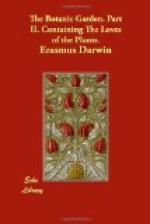With
sighs and sorrows her compassion moves,
And
wins the damsel to illicit loves.
The
Monster-offspring heirs the father’s pride,
Mask’d
in the damask beauties of the bride.
305 So, when the Nightingale in eastern bowers
On
quivering pinion woos the Queen of flowers;
Inhales
her fragrance, as he hangs in air,
And
melts with melody the blushing fair;
Half-rose,
half-bird, a beauteous Monster springs,
310 Waves his thin leaves, and claps his glossy wings;
Long
horrent thorns his mossy legs surround,
And
tendril-talons root him to the ground;
Green
films of rind his wrinkled neck o’espread,
And
crimson petals crest his curled head;
315 Soft-warbling beaks in each bright blossom move,
And
vocal Rosebuds thrill the enchanted grove!—
Admiring
Evening stays her beamy star,
And
still Night listens from his ebon ear;
While
on white wings descending Houries throng,
320 And drink the floods of odour and of song.
When
from his golden urn the Solstice pours
O’er
Afric’s sable sons the sultry hours;
When
not a gale flits o’er her tawny hills,
Save
where the dry Harmattan breathes and kills;
[The dry Harmattan. l. 324. The Harmattan is a singular wind blowing from the interior parts of Africa to the Atlantic ocean, sometimes for a few hours, sometimes for several days without regular periods. It is always attended with a fog or haze, so dense as to render those objects invisible which are at the distance of a quarter of a mile; the sun appears through it only about noon, and then of a dilute red, and very minute particles subside from the misty air so as to make the grass, and the skins of negroes appear whitish. The extreme dryness which attends this wind or fog, without dews, withers and quite dries the leaves of vegetables; and is said of Dr. Lind at some seasons to be fatal and malignant to mankind; probably after much preceding wet, when it may become loaded with the exhalations from putrid marshes; at other seasons it is said to check epidemic diseases, to cure fluxes, and to heal ulcers and cutaneous eruptions; which is probably effected by its yielding no moisture to the mouths of the external absorbent vessels, by which the action of the other branches of the absorbent system is increased to supply the deficiency. Account of the Harmattan. Phil. Transact. V. LXXI.
The Rev. Mr. Sterling gives an account of a darkness for six or eight hours at Detroit in America, on the 19th of October, 1762, in which the sun appeared as red as blood, and thrice its usual size: some rain falling, covered white paper with dark drops, like sulphur or dirt, which burnt like wet gunpowder, and the air had a very sulphureous smell. He supposes this to have been emitted from some distant earthquake or volcano. Philos. Trans. V. LIII. p. 63.




